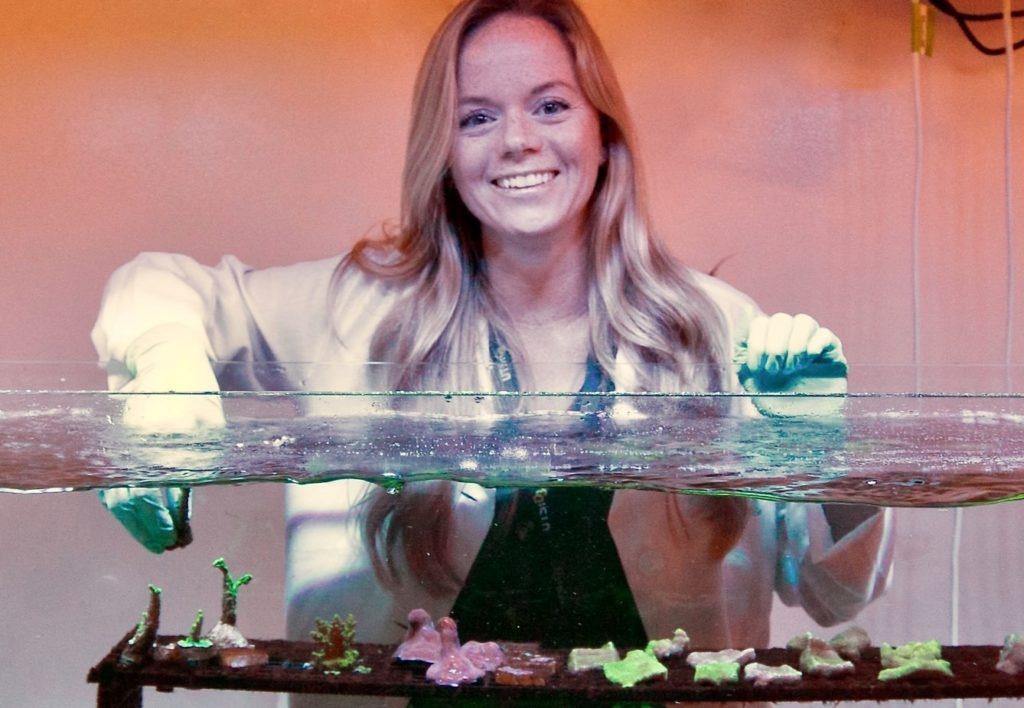Dr Jennifer Matthews first sighted coral while learning to scuba dive in Thailand.
While she was taken aback by the beauty of the coral she saw, she was later disheartened to hear from her instructor that much of what she’d just seen was actually “bleached” due to abnormally warm ocean temperatures.
She couldn’t have known it at the time, but that moment was about to change everything about her life and career. It plunged her deep into science, a subject she concedes she wasn’t particularly good at while at school but one she always found fascinating.
She learnt that coral bleaching was occurring on a mass scale all over the world, and was determined to learn more about its causes and the opportunities to change the story.
Now a marine biologist, Dr Matthews is working to find solutions to some of the most critical environmental challenges of our time, including coral reef resilience against climate chance and developing solutions to marine microplastic pollution.
She also investigates the life-saving nutrient interactions in corals, to better inform conservation activities and to help safeguard the world’s coral reefs.
Having also gained broad experience working in ecotourism, policy development, marine resource management and research, Dr Matthews is well positioned globally to enable what she discovers to lead to significant environmental benefits.
And she knows that it’s not just coral that needs resilience to survive — women in STEM have faced so many obstacles and setbacks, but passion and dedication are driving women to do incredible and game-changing work.
“I personally believe it is the perseverance, not the innate ability, that matters most for a career in STEM,” she says.
“It doesn’t matter if you’re top of your class or not, it takes effort to have the career you dream of. So let your passion inspire you, and perhaps others along the way, to success.
She’s the latest STEM Changemaker to answer our Q&A, in line with, The STEM Wrap, our newsletter on women in STEM. Subscribe to The STEM Wrap here.

In one sentence, how do you describe what you do?
I am a marine biologist exploring the nutritional interactions underpinning coral reef health and resilience to environmental change.
What put you on this career path?
If I’m completely honest, I’m not sure I ever had a specific career in mind. I started out as the founder and manager of the marine conservation organisation Big Blue Conservation in Thailand, for which I engaged in ecotourism and marine conservation.
After finishing my PhD, I worked in government for a few years and helped develop policies and manage marine resources.
A thirst for research and to develop innovative solutions to environmental challenges lead me to my current postdoctoral fellowship at UTS. I have thoroughly enjoyed each part of my career journey, and my broad experience has given me an appreciation of the various levels of science development.
What is behind the hard work that put into this area?
Science was actually never my strongest subject in school, but it was the subject I found most fascinating. I really enjoyed discovering how the world works, especially biology and how processes within a single cell can define an observable characteristic. Also, the fear that we are rapidly losing our natural resources due to local and global impacts is a driving force in my passion for nature conservation.
What’s been particularly pivotal in supporting your career in STEM?
While learning to SCUBA dive in Thailand, I caught my first glimpse of corals – all these fluorescent pinks, bright yellows, neon blues – I thought they were incredibly beautiful.
But it was upon asking my dive instructor about them that I found out these corals were, in fact, ‘bleached’ as a consequence of the abnormally hot sea temperatures at the time.
Coral bleaching is the temporary loss of the essential algal symbionts that normally provide the coral with the nutrition and resources to survive challenging marine environments, and if the sea surface temperatures didn’t reduce soon to allow the coral-algae relationship to re-establish, these corals would likely all die.
And on top, this was happening to coral reefs on a global scale, with increasing frequency. I was devastated by that reality, and so I started on my journey to finding out more about what happens to corals when they bleach, and how we might enhance coral resilience to the increasing environmental pressures inflicted on reefs.
What more needs to or can be done to support more women in STEM?
It’s not just corals that need resilience to survive. Most women in STEM have experienced numerous failures and obstacles in their journey to success, and being women can mean we face more than our fair share.
But a passion and dedication for the topic motivates us to increase our efforts, persist in our research and look for new solutions to a problem – this is the epitome of resilience and encouraging this skill is key to fostering the next generation of women in STEM.
Are there any key tips you can share for other women in STEM?
I personally believe it is the perseverance, not the innate ability, that matters most for a career in STEM.
It doesn’t matter if you’re top of your class or not, it takes effort to have the career you dream of. So let your passion inspire you, and perhaps others along the way, to success.


